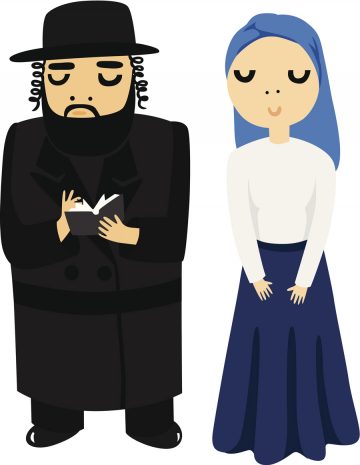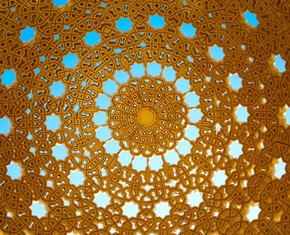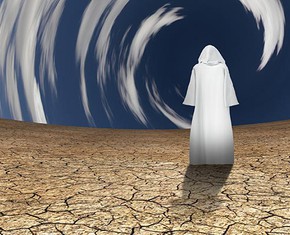The views expressed in our content reflect individual perspectives and do not represent the authoritative views of the Baha'i Faith.
What’s the difference between ethnicity, heritage, religion and faith?
A few days ago I wanted to wish all my Jewish friends a very Happy Rosh Hashanna—the Jewish New Year—and at the same time I began to reflect on my own ancestry.
You see, my name is “Rebecca” which is historically a very Jewish name. Many times when I meet people from the Jewish community and tell them my name they joyfully say “Oh you are Jewish!” and right away feel a closeness. “Well …,” I explain, “I am indeed from Jewish descendants, but I am a Baha’i!”
I usually get a puzzled look … Then comes the typical question: “Are your ancestors, especially from your mother’s side Jewish?”
“Yes!” I reply.
Then I hear a sigh of relief and I am told: “Ah … so you ARE Jewish then.”
Even when I repeat that I am a Baha’i, I soon realize that for most Jews being Jewish does not mean my beliefs—instead, it defines what my heritage and lineage is.
But what really defines a “Jew”? Is it considered an ethnicity? Is it a preordained destiny? Is it a choice? Is it a religion? Is it a set of beliefs? Or is it purely related to your matrilineal descent?
 Traditionally, in Orthodox and Conservative Judaism, the Halakha (the body of ancient Jewish law) defines a Jew as someone whose mother is Jewish, or as someone who has formally converted to the Faith. Reform and Reconstructionist Jews define a Jewish person as someone whose mother or father followed Judaism, or as a convert, as well.
Traditionally, in Orthodox and Conservative Judaism, the Halakha (the body of ancient Jewish law) defines a Jew as someone whose mother is Jewish, or as someone who has formally converted to the Faith. Reform and Reconstructionist Jews define a Jewish person as someone whose mother or father followed Judaism, or as a convert, as well.
So do I fit the definitions? Well, I do believe in the prophets Abraham and Moses, the original founders of Judaism. I believe in the Torah—the first five books of what Christians call the Old Testament of the Bible. Is that what makes me a Jew? But then, as a Baha’i, I also believe that Christ and Muhammad were divine prophets, too. Does that disqualify me as a Jew?
I also don’t believe that any part of humanity are “the chosen ones” because I don’t believe God has favorites within His own creation.
All of these identity questions make me want to know: What does it really mean to “change” your religion? Does going through a few rituals “make” you a Jew, because the man you want to marry wants to marry a Jewish woman?
So again I invite you to ask yourself … what really makes your religion your religion? Was it your destiny? Was it handed down to you? Did it come with your culture, your family’s customs and holy days?
Or was it your choice of belief after independent investigation of truth? Baha’is believe that religion should not be inherited or accepted blindly, but should be a conscious personal choice, made after an independent search for the truth:
Although some attend churches and temples of worship and devotion, it is in accordance with the traditions and imitations of their fathers and not for the investigation of reality. For it is evident they have not found reality and are not engaged in its adoration. They are holding to certain imitations which have descended to them from their fathers and ancestors. They have become accustomed to passing a certain length of time in temple worship and conforming to imitations and ceremonies. The proof of this is that the son of every Jewish father becomes a Jew and not a Christian; the son of every Muslim becomes a follower of Islam; the son of every Christian proves to be a Christian; the son of every Zoroastrian is a Zoroastrian, etc. Therefore, religious faith and belief is merely a remnant of blind imitations which have descended through fathers and ancestors. Because this man’s father was a Jew, he considers himself a Jew. Not that he has investigated reality and proved satisfactorily to himself that Judaism is right—nay, rather, he is aware that his forefathers have followed this course; therefore, he has held to it himself.
The purpose of this is to explain that the darkness of imitations encompasses the world. Every nation is holding to its traditional religious forms. The light of reality is obscured. Were these various nations to investigate reality, there is no doubt they would attain to it. As reality is one, all nations would then become as one nation. So long as they adhere to various imitations and are deprived of reality, strife and warfare will continue and rancor and sedition prevail. If they investigate reality, neither enmity nor rancor will remain, and they will attain to the utmost concord among themselves. – Abdu’l-Baha, The Promulgation of Universal Peace, pp. 221-222.
This is my core belief that makes me a Baha’i:
The religion of God is the One Religion, and all the Prophets have taught it, but it is a living and a growing thing, not lifeless and unchanging. In the teaching of Moses we see the Bud; in that of Christ the Flower; in that of Baha’u’llah the Fruit. The flower does not destroy the bud, nor does the fruit destroy the flower. It destroys not, but fulfills. The bud scales must fall in order that the flower may bloom, and the petals must fall that the fruit may grow and ripen. Were the bud scales and the petals wrong or useless, then, that they had to be discarded? Nay, both in their time were right and necessary; without them there could have been no fruit. So it is with the various prophetic teachings; their externals change from age to age, but each revelation is the fulfillment of its predecessors; they are not separate or incongruous, but different stages in the life history of the One Religion, which has in turn been revealed as seed, as bud and as flower, and now enters on the stage of fruition. – Abdu’l-Baha, quoted by J.E. Esselmont in Baha’u’llah and the New Era, pp. 122-124.
You May Also Like
Comments

















I am not a very religious person, but let me explain a scientifically proven fact about Jews. Did you know that the Jews comprise only 0.2% of the population of the world. However 20% of the winners ...of Noble Prizes which can only be won by genius people only have been Jewish. This is a statistical fact. That means that a Jewish person in 10,000 times more likely to win a Noble prize compared to a non-Jewish people.
Sheila Guttman
Dt 7:7 The LORD did not set his affection on you and choose you because you were more numerous than other peoples, for you were the fewest of all peoples."
I believe similar statements have been tests to the followers of every religion who consider theirs to be final, for example Jesus being the only way ...to truth and prophet Mohammad being seal of prophets.